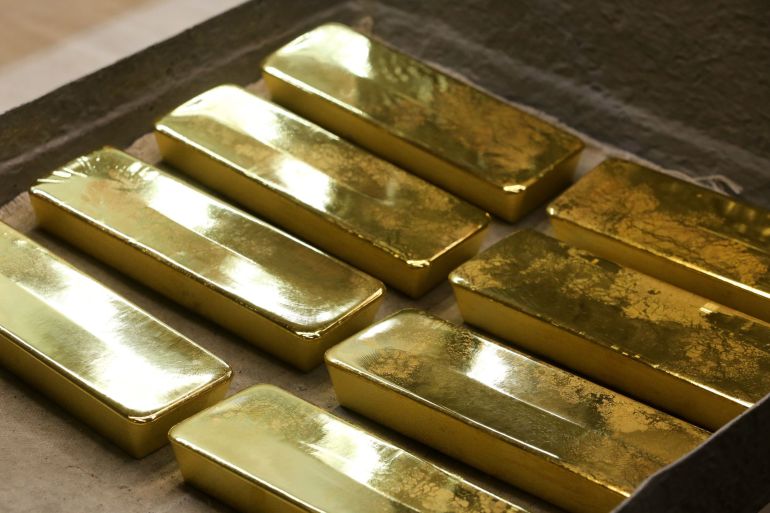EU proposes new sanctions on Russian gold exports
The move follows a decision taken by the world’s most industrialised nations at a G7 meeting in late June.

The European Union is set to target Russian gold exports in an update to its sanctions packages while further tightening previous measures on Moscow amid the continuing war in Ukraine.
The EU has so far approved six packages of sanctions on Russia with the last one passed in June that imposed a ban on most Russian oil imports.
Keep reading
list of 3 itemsRussia defends submarine missile attack that killed 23 civilians
What happened to Russia’s anti-war movement?
“Russia’s brutal war against Ukraine continues unabated. Therefore, we are proposing today to tighten our hard-hitting EU sanctions against the Kremlin, enforce them more effectively and extend them until January 2023,” said EU Commission President Ursula von der Leyen in a statement on Friday.
“Moscow must continue to pay a high price for its aggression,” she added.
Moscow must continue to pay a high price for its aggression against Ukraine.
We are proposing to tighten our hard-hitting EU sanctions by introducing a new import ban on Russian gold, reinforcing our technology export controls and extending them until 2023.#StandWithUkraine
— European Commission 🇪🇺 (@EU_Commission) July 15, 2022
The move on gold exports fulfils a decision agreed upon by the world’s most industrialised nations at a G7 meeting in late June in which EU members Germany, France and Italy took part. The United States, United Kingdom, Canada and Japan have already imposed the ban.
The proposal from the commission, which draws up international sanctions for the bloc’s 27 countries, will be discussed at a meeting of EU foreign ministers on Monday.
EU governments must now agree on the measures for them to become law, although diplomats said they were uncontroversial and should pass through easily.
Six previous rounds of sanctions have targeted Russia’s economy, financial system, central bank, top government officials, as well as Russian President Vladimir Putin and his inner circle.
Some of the punitive measures only started going into effect last month after a transition period.
Ukrainian demands
On Thursday, Ukrainian Deputy Prime Minister Olga Stefanishyna urged the EU to adopt new sanctions against Russia.
“We hope the next, seventh package of sanctions will have a strong restrictive potential and will be taken without further delay and as soon as possible,” Stefanishyna told reporters before an informal meeting of EU affairs ministers held by the Czech presidency of the 27-nation bloc in Prague.
Maros Sefcovic, deputy head of the European Commission, said that the EU would also seek to “close all exit routes for those wanting to bypass the sanctions”.
“It is, of course, a very complex mechanism, so we need to not only set up but also check, monitor and close the places that would create platforms for an exit in some way,” Sefcovic, who was also in Prague, added.
He dismissed the notion of fatigue for helping Ukraine among EU members, which Russia invaded on February 24.
“I have never seen so strongly demonstrated unity and effort from all member states to look for all possible reserves, whether we talk about financial aid or arms supplies,” Sefcovic said.